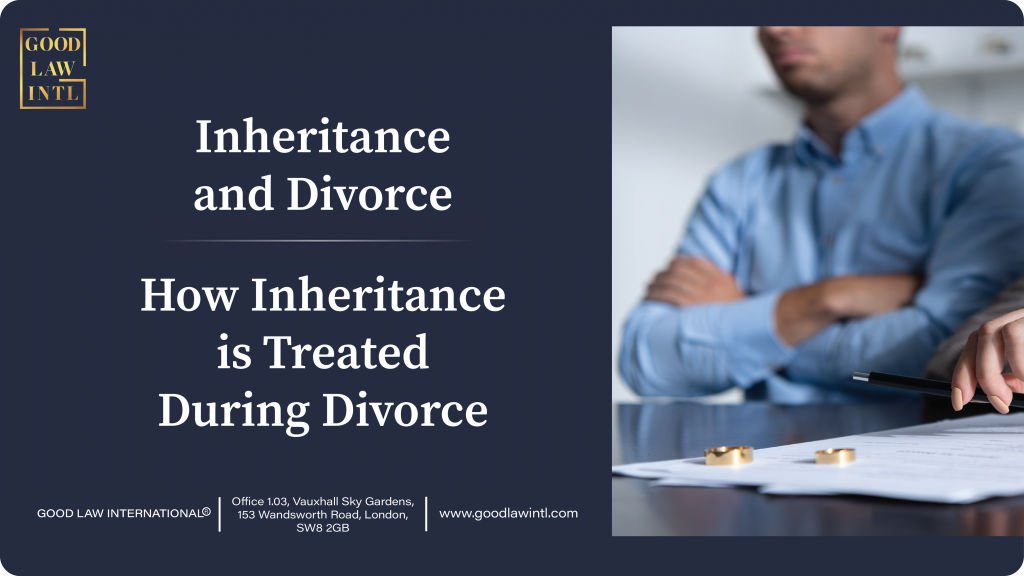
Inheritance and Divorce:
How Inheritance is Treated During Divorce

Lara Shehadeh
Family Paralegal
Inheritance and Divorce: How Inheritance is Treated During Divorce
Divorce is an emotionally and financially complex process. One of the key areas that often causes confusion is how inherited assets are treated when a couple decides to separate. While the division of matrimonial assets like the family home, savings, and pensions are common considerations, inheritance often presents a unique challenge.
This blog explores how inheritance is treated during divorce proceedings in the UK, including when it is considered part of the matrimonial pot and when it might be excluded.
Matrimonial vs. Non-Matrimonial Assets: The Distinction
UK courts make a clear distinction between matrimonial and non-matrimonial assets when dividing property in a divorce. Matrimonial assets are those acquired during the course of the marriage and are generally subject to division. These typically include income, savings, property, and pensions that were built up while the couple was together.
On the other hand, non-matrimonial assets usually refer to property owned by one spouse before the marriage, gifts, or inheritance. In principle, these non-matrimonial assets are not automatically included in the divorce settlement. However, the situation is rarely straightforward.
Inheritance: A Non-Matrimonial Asset?
Inheritance is typically considered a non-matrimonial asset, meaning it is not automatically subject to division between the divorcing spouses. However, its treatment depends on a range of factors, including:
In high-net-worth cases where the matrimonial pot is large enough to cover both parties’ reasonable financial needs, the court is more likely to leave inherited assets untouched. However, in cases where the resources are limited, inheritance may be brought into the settlement to provide for housing or child maintenance. unique circumstances of the case rather than following the more standardized Hague Convention procedures.
Timing of the Inheritance:
If one party received the inheritance before the marriage, it is more likely to be treated as non-matrimonial and excluded from the asset pool.
If the inheritance was received during the marriage, the situation becomes more complicated. While it may still be treated as non-matrimonial, the courts will consider its use and whether it has been “mingled” with matrimonial assets.
How the Inheritance Was Used:
If the inheritance has been kept separate, for instance, held in a distinct bank account, it is more likely to be protected.
Conversely, if the inheritance was used for the benefit of both parties during the marriage, such as for buying a family home, the court may deem it a matrimonial asset and subject it to division. This process is referred to as “mingling” or “intermingling”.
Financial Needs of Both Parties:
- The court’s primary consideration in divorce cases is to meet the financial needs of both spouses and any dependent children. If the matrimonial assets alone are insufficient to meet these needs, the court may consider inherited assets to ensure a fair outcome.
- In high-net-worth cases where the matrimonial pot is large enough to cover both parties’ reasonable financial needs, the court is more likely to leave inherited assets untouched. However, in cases where the resources are limited, inheritance may be brought into the settlement to provide for housing or child maintenance.
The Court’s Approach to Fairness
In English and Welsh law, the court’s overriding goal in divorce cases is achieving fairness, with the welfare of any children taking priority. While inherited assets might technically be non-matrimonial, the court will ultimately consider how to achieve a fair division of property, ensuring that both parties, especially the financially weaker spouse, are provided for.
Practical Considerations for Protecting Inheritance
There are ways to better protect inheritance during a marriage and in case of divorce:
In some cases, placing inheritance in a trust may protect it from being divided during divorce proceedings. However, trusts themselves can be subject to scrutiny, and courts will look at whether trust assets have been used for the couple’s benefit during the marriage.
- Pre-Nuptial and Post-Nuptial Agreements:
These agreements allow couples to clearly set out how they intend to treat their finances, including inheritance, should they divorce. While not legally binding in England and Wales, courts will give significant weight to pre-nuptial and post-nuptial agreements, provided they are entered into freely, with full disclosure and proper legal advice.
- Keeping Inheritance Separate:
If you receive an inheritance, keeping it separate from the matrimonial assets can make it easier to argue that it should not be included in the divorce settlement. This means not using the funds to buy joint assets, such as the family home, or co-mingling them with joint accounts or savings.
- Trusts:
In some cases, placing inheritance in a trust may protect it from being divided during divorce proceedings. However, trusts themselves can be subject to scrutiny, and courts will look at whether trust assets have been used for the couple’s benefit during the marriage.
Conclusion
While inheritance is generally considered a non-matrimonial asset, the reality is that it can be included in the asset division in a divorce, depending on various factors. The courts are primarily concerned with fairness and ensuring that both parties’ needs are met. Inheritance is more likely to be protected if it is kept separate and if both parties’ financial needs can be met from other assets.
Anyone going through a divorce who has concerns about inheritance should seek independent legal advice. Inheritance is a complex area, and each case will turn on its specific facts, including the amount of inheritance, how it was used, and the overall financial situation of the couple.
For specialist advice and support. Please get in touch with our corporate solicitors in London by contacting the GOOD LAW INTL office.
A warm welcome to GOOD LAW INTL. To learn more about us and our practice areas, we invite you to browse through our website and contact us or book an appointment.



